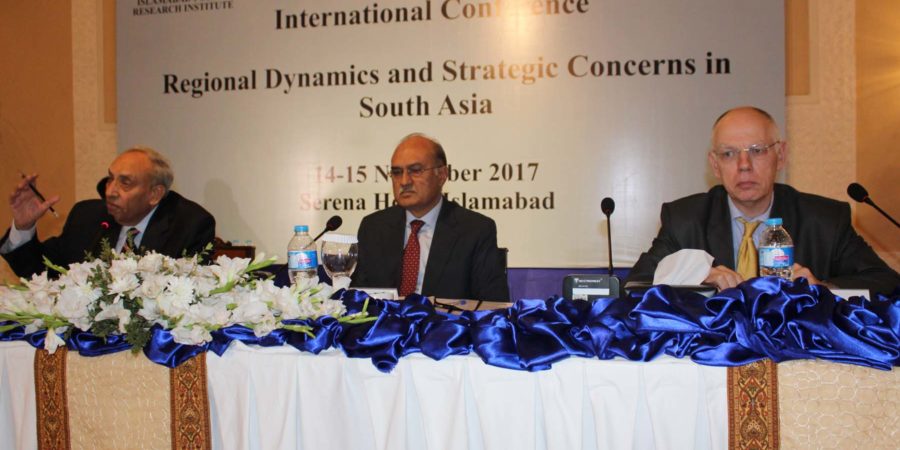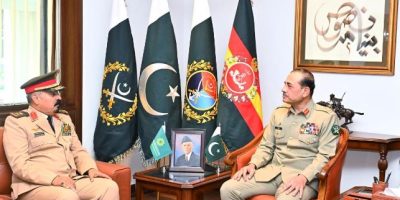Afghan situation main cause of instability in region

‘The armed confrontation in Afghanistan which, despite the efforts of the country’s central government and external forces supporting it (including SCO members) remains the main destabilizing factor in South Asia.’ This was stated by His Excellency Mr Vladimir Potapenko, Deputy Secretary-General, Shanghai Cooperation Organization (SCO) at the second day of the international conference organized by the Islamabad Policy Research Institute and the Hanns Seidel Foundation here in Islamabad today. Addressing the session on ‘Strategic Situation in Afghanistan and its Regional Implications’, he said that the SCO member states are interested in Afghanistan as a peaceful and neutral country that respects and observes human rights and freedoms, and maintaining friendly relations with its neighbors. Outlining SCO’s vision, Mr Potapenko, highlighted that the Astana declaration resolutely supported the efforts of the Government and the people of Afghanistan aimed at asserting a peaceful and stable state free of terrorism, extremism and illegal drug trafficking based on the United Nations’ central coordinating role in international efforts to stabilize the country and ensure its development. He informed the packed hall that Kabul is being provided wide-scale assistance in areas as defense, law enforcement, transport development, energy, anti-drug operations, training national experts, etc., both on bilateral and multilateral bases. The SCO members take an active part in a number of important international regional projects that also involve Afghanistan. However, the presence of Islamic State (ISIS) militants in Afghanistan, many of whom are originally rooted from SCO member states, causes additional concern. ‘The return of militants, who fought on the side of international terrorist organizations, to their home countries can add to regional instability’, he warned.
Sharing Pakistan’s concerns on India’s influence in Afghanistan, Ambassador (R) Rustam Shah Mohmand, Former Ambassador of Pakistan to Afghanistan, said that the ongoing conflict has multidimensional implications for the former – from a stabilized border to acts of terrorism; decrease in the volume of bilateral trade to the plight of both refugees and returnees. He opined that ‘ignoring the cost of not inviting attention to the root cause of the insurgency and the continuance of a conflict that has robbed the region of huge economic opportunities, Islamabad has instead remained preoccupied with India’s role in the West Asian country, and not formulated a robust approach for peace-making in Afghanistan.’ While Pakistan’s apprehensions about India’s increasing role in Kabul are natural, there can be no compromise on Islamabad insisting that Afghan soil should not be used covertly or overtly against its territory or people. At the same time, Afghanistan’s right to formulate its own policies both internal and external must also be acknowledged and respected. But no such policy that creates space for any force or country to operate against Pakistan’s interest should be allowed to practice’, he stressed.
Dr. Attaullah Wahidyar, Senior Advisor from the Ministry of Education, Kabul, discussing the ingress of non-state actors in South Asia was of the view that Daesh, Islamic State or ISIS are all part of the same ‘terrorism industry’. However, he felt that while the entire globe hosts such agar plates like the Islamic State of Iraq, Asia in general and central Asia specifically seems to be more generous where ISIS has over 8000 recruits. ‘IS is focusing on conquering weak states and weakening strong states and to address this challenge a two-dimensional approach is needed – reform in social architecture of societies; and popular Muslim scholarship needs to come forward and reinforce the true message of Islam by clarifying the true meaning of Jihad. ‘We as nation states need to recognize that shared security is more secure than ensured security. Investment in violent non-state actors for achieving state objectives has historically failed and any state which pursues such policies will suffer sooner or later’, he cautioned. He clarified that Pakistan should not be concerned about Indo-Afghan relations. ‘While Kabul welcomes economic assistance from any side, these relations with India will never be at the cost of Pakistan’s security.’
Ambassador (R) Mohammad Sadiq, Former National Security Secretary and Ambassador of Pakistan to Afghanistan, Government of Pakistan, while chairing the session “Strategic Situation in Afghanistan and its Regional Implications” said that while the stalemate in Afghanistan is not going to end soon, there are clear ethnic fault-lines which the Taliban cannot cross. ‘No one knows what the US policy in Afghanistan will be under the Trump administration but there is no likelihood of a permanent pullout of America from the region.
He stressed that Pakistan should not object to India’s economic assistance to Afghanistan, rather Pakistan, should also offer the same.
In the session on ‘Addressing Security Concerns in South Asia: A Way Forward’, Professor Dr Pervaiz Iqbal Cheema, Dean, Faculty of Contemporary Sciences, National Defence University provided a comprehensive overview of the Jammu and Kashmir dispute and said that in the aftermath of the cold-blooded murder of Burhan Muzaffar Wani, a wave of carnage has been unleashed by India across the occupied Valley. According to him, the US’s ever increasing cooperation with India and its lukewarm response to Islamabad’s call, is yet another factor, which encourages New Delhi to adopt an offensive behavior towards Pakistan. Modi’s Kashmir policy has resulted in failure, causing despondency among the people of the Indian Occupied Kashmir (IOK). He said that an unresolved Kashmir issue is a historical fact, which cannot be sidelined and ignored for too long. Even a minor miscalculation by India, in pursuit of its foreign policy objectives for undermining Islamabad’s will to resist, could put the entire region in trouble. India and the international community should, therefore, realize that none of the strategies other than ‘dialogue’ involving all the stakeholders would succeed in resolving this core issue. He warned that India’s decision to pursue an aggressive foreign policy to subdue Pakistan and its tactic to implement such policy entails a perilous course of action. ‘Under the prevailing security and political situation in the region and beyond, no single-track approach by Pakistan would work against India. Pakistan will have to evolve a simultaneous response aggressively to include diplomatic maneuvers and security counter measures,’ he concluded.
Dr. Christian Wagner, Senior Fellow from the German Institute for International and Security Affairs, Germany was of the view that while South Asia is still one of the most conflict-prone regions in the world, the role of global powers in building a cooperative security order here will remain limited. ‘Global powers pursue their own strategic interests which are not necessarily in accordance with regional powers. There is a divergence in the threat perceptions between global powers and regional powers on nuclear issues and terrorism. These differences will limit the role of global powers’, he shared. ‘It remains the responsibility of regional states to establish new forms of cooperation in order to tackle common security threats,’ he urged. This session was chaired by Lt. General (R) Naeem Khalid Lodhi, HI (M)
Former Secretary Defence and Member, Advisory Board of the Center for Strategic and Contemporary Research (CSCR), Islamabad.
Sharing the views about the Hanns Seidel Foundation, Mr Omer Ali, Programme Coordinator of HSF said that their mandate is informed by the very particular German experience which is to break through traditional perspectives and at times apply innovative, previously unthinkable approaches with regards to formulating policies. ‘This started off with the Franco-German rapprochement, and has culminated in a number of transnational bodies, the most important of which certainly would be the European Union, which might soon replace the nation-state through continuous supra-national integration’, he explained. Mr Ali hoped that the ‘concerned authorities in Pakistan will assess all those bits and pieces which have been presented in a very condensed manner during this two-day international conference, and draw conclusions as to where Pakistan can move, and subsequently make a normative move and say where it should move.’
In his concluding Vote of Thanks, Ambassador (R) Abdul Basit, President, IPRI was optimistic that the deliberations which emerged out of the conference had the potential to chalk out future trajectories for Pakistan’s foreign policy in a highly dynamic geographic and strategic environment. ‘The Kashmir issue remains the core bone of contention between Pakistan and India – peace in the region is dependent on its amicable and just resolution,’ he concluded.
Related News

IMCTC Chief meets Army Chief at GHQ
RAWALPINDI, FEB 2 /DNA/ – Major General Mohammed Bin Saeed Al-Moghedi, Secretary General of theRead More

Thailand hands over the ASEAN Committee chairmanship to Indonesia
H.E. Lt. Gen. (Rtd.) Chandra Warsenanto Sukotjo, Ambassador of Indonesia to Pakistan, assumed the roleRead More


Comments are Closed